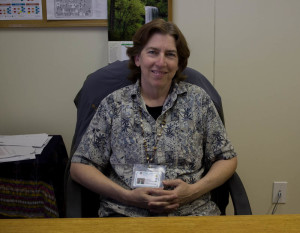Tags
Related Posts
Share This
SFUAD’s Therapist
“Learning how to take care of yourself is a skill set. You have to practice these things a few times. It’s going to feel awkward, it’s going to feel artificial, it’s going to feel forced. It’s true of any skill.”
So says Carol Patterson, or CJ, SFUAD’s on-campus therapist, who is available three days a week at no cost. Patterson is a fairly new resident to New Mexico, but has been a counselor and therapist for many years. She received her undergraduate degree from U.C. Berkley, and her graduate degree is in counseling from San Francisco State College. She says about being in Santa Fe: “This is a great configuration for me because I love art and I love working with young adults and traditional college age students.”
Jackalope sat down with Patterson to get the feel of an average day for students interested in seeking counseling sessions. On any given day, “I usually meet with four or five [students]…usually the sessions are around an hour.” She mentioned that new meetings will sometimes go longer, although typically 50 minutes are just right, “but if we’re not done by 50, I don’t say ‘well, times up!’”
Patterson sees some students long term, or more than once, but it varies. Her contract allows her to provide free counseling for up to approximately 12 sessions per student. If it takes two or three, that works, and if it takes more, she does what she can. “It’s whatever supports that student—that’s my goal.” In certain cases, Patterson recommends outside therapists. In cases of heavy substance abuse and heavy duty eating disorders, her services are not equipped for dealing with the attention required at that level. With these issues, however, Patterson wholeheartedly welcomes students to come speak with her so she can help them connect with those who are able to give them the attention and assistance needed.

Carol CJ Patterson sitting in her office on campus. Photo by Kyleigh Carter.
As a note to all students, Patterson’s office cannot provide prescriptions to psychotropic drugs (antidepressants, anti-anxiety, anti-psychotics). This includes SSRIs, otherwise known as mood-affecting medications. With hundreds of different insurance companies represented on campus, Patterson does her best to assist students who are seeking medications of this nature.
Patterson sees many different students and different types of students, and the No. one topic among all: depression and anxiety. “One of my sayings is, if you’re not a little bit depressed, or anxious, there’s something wrong. We live in a tough world, so I see a lot of depression.” When asked if she thinks depression is associated primarily with the traditional college aged student, she replied, “I think it’s associated with being human.”
The main points Patterson wants to students to know is that her services are free and all of the sessions are confidential. She notes that there’s one common misconception that if a student comes in with suicidal thoughts they believe they’ll be reported—this is not the case. “The only time confidentiality is broken is if somebody has a well-formulated plan and is saying ‘yes, I’m going to do this.’” Many folks with suicidal thoughts, however, say ‘I want to be dead,’ and without a plan in mind these are the cases that can be resolved through talk therapy. “I think people are embarrassed and ashamed of those kinds of thoughts,” she says, “it’s unfortunate because talking about them alleviates it.”
Patterson also consults for SFUAD’s University Behavioral Intervention Team (UBIT). UBIT includes also Debra Tervala, the interim provost, Peter Romero, head of secruity, and some department chairs. The group meets once every two weeks to discuss referrals, and information passed through word-of-mouth about students who may have significant issues. “Sometimes it’s just behavioral—something against the rules, but we also talk about interventions, and we assess [those with] potential danger to oneself or others,” Patterson says.
Therapy & Mental Health Services
Although Patterson prefers appointments, if a student is in crisis, s/he is welcome to walk in. Students also can call Patterson directly, or contact her by e-mail. The number and her services are different from the health center on campus, although she’s right next door in the portable.
Hours: Monday, Tuesday and Thursday 10 a.m. to 6 p.m.
Carol (CJ) Patterson, LPCC
Mental Health Therapist
505-473-6362
After hours mental health emergencies call at anytime:
Crisis Response of Santa Fe (505) 820-6333 or (800) 273-8255






 Jackalope Magazine is the student magazine of Santa Fe University of Art and Design. Building on the interdisciplinary nature of our education, we aim to showcase the talent of our university and character of our city.
Jackalope Magazine is the student magazine of Santa Fe University of Art and Design. Building on the interdisciplinary nature of our education, we aim to showcase the talent of our university and character of our city.
Recent Comments